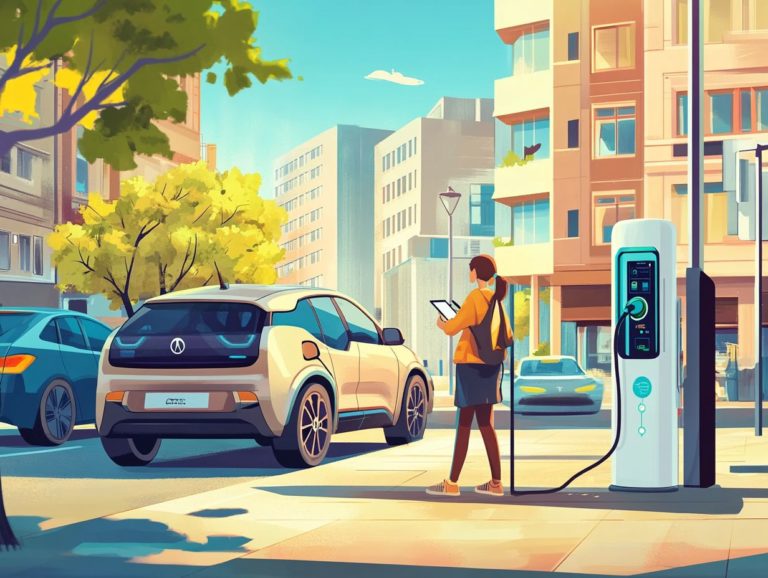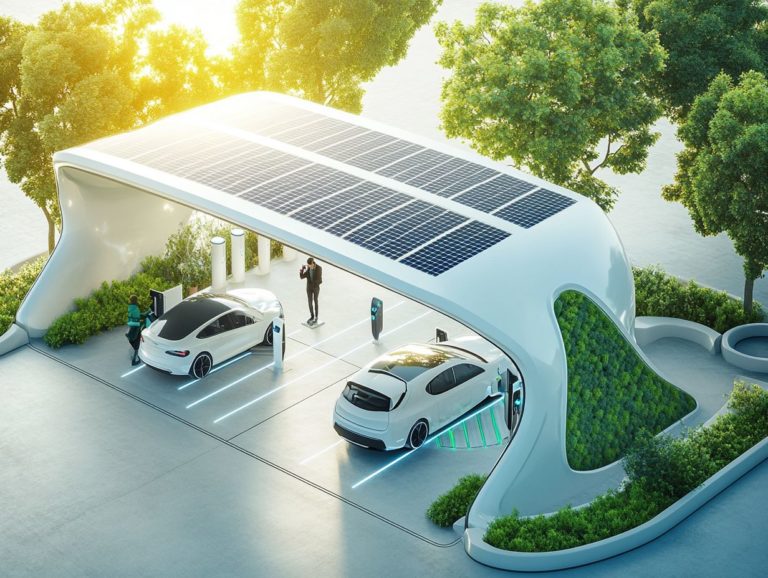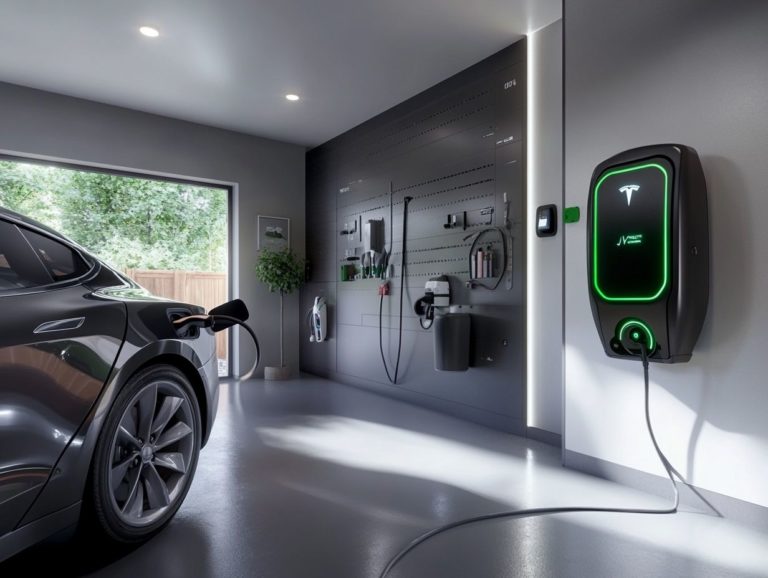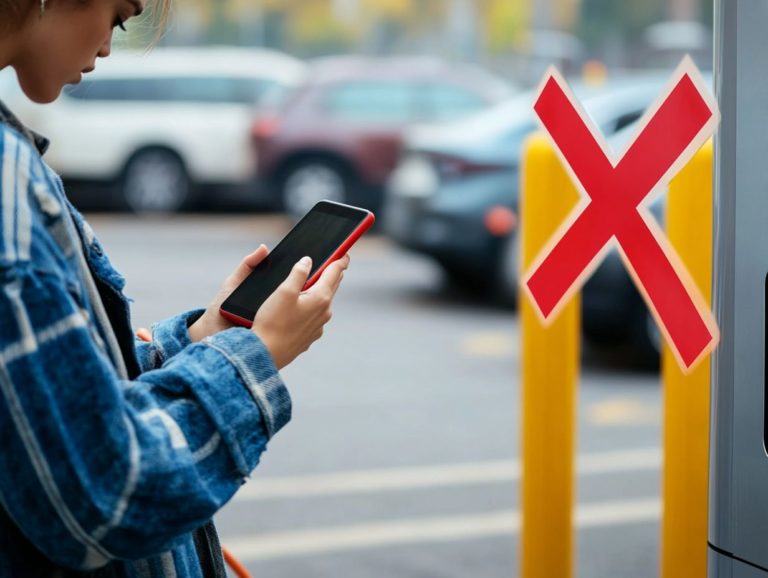How to Choose the Right EV Charger for You
As electric vehicles (EVs) become increasingly popular, it s vital for you to understand the various types of EV chargers available.
From Level 1 chargers that simply plug into standard outlets to the robust DC fast chargers, the options can feel a bit daunting. Act now to consider key factors such as charging speed, vehicle compatibility, and whether you ll be charging at home or on the go.
Installation and maintenance are equally important. They significantly contribute to a smooth charging experience.
This guide will help you navigate every aspect, empowering you to make informed decisions.
Contents
Key Takeaways:

- Consider your charging needs: Think about where you will be charging your EV (home or public) and how often you will need to charge to determine the type of charger you need.
- Ensure compatibility: Make sure the charger is compatible with your specific EV model to avoid any potential issues or damage.
- Budget accordingly: Consider the cost of the charger and any installation or maintenance fees to stay within your budget and avoid unexpected expenses.
What Are EV Chargers?
EV chargers are essential devices designed to recharge electric cars. They come in various types tailored to meet different needs and environments. From home chargers to public charging stations, they provide the flexibility and convenience that electric vehicle owners appreciate.
The charging speed and power output can vary significantly, making it crucial for you to choose the right charger to optimize your electric car’s battery capacity. Additionally, if you’re looking for information on how to locate EV charging stations near you, some chargers are compatible with solar power systems, offering an eco-friendly option.
Among the most common types are Level 1 chargers, which deliver a slow but steady charge using standard household outlets. Level 2 chargers offer much faster recharging capabilities perfect for home installations or public locations. If you re often on the go, DC fast chargers are a game-changer, allowing you to quickly replenish your battery during long trips.
It s vital to consider charging speed because a higher power output translates to quicker recharges, making your overall EV experience more efficient and convenient. Many modern chargers adhere to stringent safety standards, ensuring not just performance but also your well-being.
This thoughtful integration marks a significant step toward sustainable energy solutions that align seamlessly with contemporary lifestyle needs.
Types of EV Chargers
There are three distinct types of EV chargers, each crafted to cater to your unique charging needs and preferences, which can help you understand how to find the right EV for your commute.
- Level 1 chargers use a standard household outlet, offering the slowest charging speed, which is often perfect for overnight use at home.
- In contrast, Level 2 chargers provide a more efficient charging option, making them well-suited for both residential and commercial applications.
- Finally, DC fast chargers are designed for those moments when time is of the essence, delivering rapid charging capabilities that are ideal for public charging stations.
Level 1 Chargers
Level 1 chargers represent the most fundamental option for EV charging, typically utilizing a standard 120-volt outlet found in most households. This makes them incredibly accessible for electric vehicle owners like you.
These chargers provide a convenient solution if your daily drives aren t particularly long. However, it s essential to note their limitations primarily their charging speed, which generally translates to about 2 to 5 miles of range for each hour of charging.
For example, if you have an EV with a 60 kWh battery, it could take over 24 hours to fully charge. While this might work well for overnight charging, it s less than ideal for anyone with a busy driving schedule. You ll also want to keep safety standards in mind, as proper installation is crucial to mitigate any risks.
Fortunately, these chargers are compatible with most electric vehicle models, making them a versatile option. The benefits include low upfront costs and ease of use, while the drawbacks often center around inadequate charging speed for those who drive frequently.
Level 2 Chargers
Level 2 chargers offer a remarkable improvement over Level 1 chargers. They provide faster charging speeds and increased power output, making them an excellent choice for both residential and public charging needs.
Typically, these chargers deliver around 240 volts. This allows electric vehicles to charge significantly quicker often within just a few hours, compared to the overnight wait time associated with Level 1 chargers. They are perfect for homeowners who want to efficiently power their electric vehicles overnight. They are also ideal for commercial spaces where quick turnaround is crucial.
When considering installation, keep in mind that Level 2 chargers usually require a dedicated circuit, which may entail some initial setup costs. You can choose between chargers with a built-in cable for immediate use or flexible plug-in models. This choice can greatly impact how conveniently the chargers can be utilized in various settings.
DC Fast Chargers
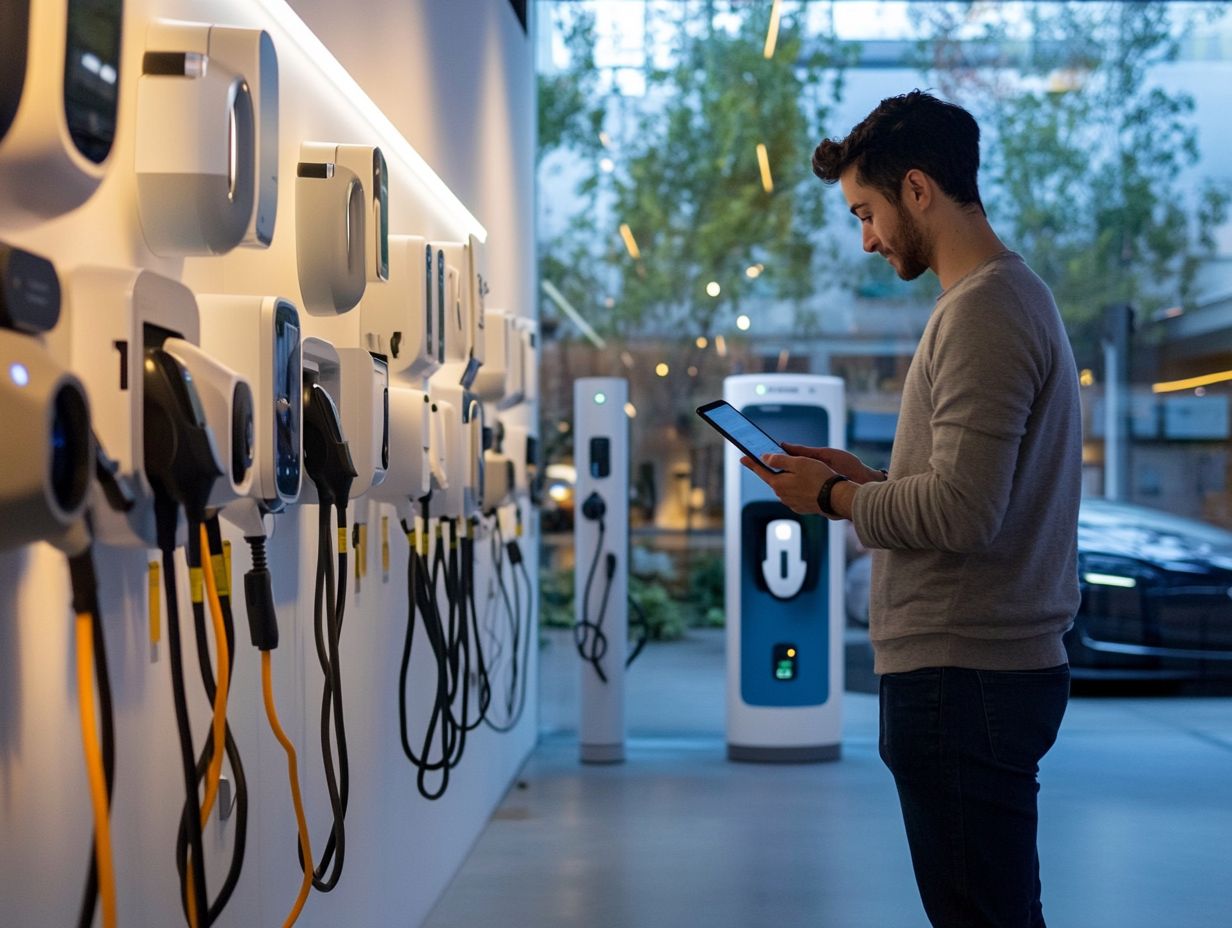
DC Fast Chargers represent the pinnacle of charging technology. They offer rapid charging speeds that can significantly reduce the time you spend plugged in at public charging stations.
With power outputs ranging from 50 kW to an impressive 350 kW, these chargers can recharge your vehicle in just 20 to 30 minutes. Compare that to Level 1 chargers, which could leave you waiting for several hours, or even Level 2 chargers typically found in homes that can take 4 to 6 hours for a full charge.
Multiple standards like CHAdeMO and the Combined Charging System (CCS) ensure compatibility across a wide range of electric vehicles. These systems accommodate both Japanese and European manufacturers. It s essential to adhere to stringent safety standards in public charging infrastructure, guaranteeing that you enjoy efficiency and have peace of mind while charging on the go.
Factors to Consider when Choosing an EV Charger
When choosing an EV charger, it’s essential to consider several factors. This ensures your charger aligns with both your electric vehicle and lifestyle. If you’re considering installing a home EV charger, whether you’re looking at home or public charging options will influence your decision.
Compatibility with your vehicle is crucial; not all chargers are created equal, and you’ll want one that suits your specific model. To make an informed choice, learn how to identify your ideal EV by considering the charging speed and power output for better energy efficiency. Budget and installation costs will also play a significant role in your decision-making process.
Home or Public Charging
Deciding between home and public charging? It’s all about convenience versus accessibility! Weigh the comfort of having a charger at home against the availability of public charging stations, which can differ in both accessibility and charging speed.
Home charging typically requires an upfront investment for installation. However, it provides the distinct benefit of being readily available whenever needed, allowing you to recharge overnight with ease. On the other hand, public charging stations can be a solid choice for those who lack home installation options or prefer not to install one due to space limitations. Just remember, they often come with longer wait times and varying costs.
As electric vehicle ownership continues to rise, many are opting for solar power systems to enhance home charging. This not only boosts sustainability but also reduces energy costs over time, making the advantages of home charging even more enticing.
Ready to choose the right charger for your electric vehicle? Explore your options today!
Vehicle Compatibility
Understanding vehicle compatibility with EV chargers is crucial for you. Different electric cars utilize various connector types like Type 1 and Type 2 which can significantly impact charging efficiency.
Each vehicle’s charging capabilities depend on these connectors. This affects not just the speed at which the battery recharges, but also how the energy in your vehicle s battery is controlled, known as energy management. For example, popular models such as the Tesla Model 3 have a unique connector that allows for faster charging at Supercharger stations, while vehicles like the Nissan Leaf typically rely on Type 1 junctions.
Different connector types affect charging speeds. A vehicle with a higher capacity charging system benefits considerably from a compatible charger. Using the right charger enhances your overall experience and maximizes battery performance.
Charging Speed and Power
When evaluating EV chargers, charging speed and power output are paramount. They directly influence how quickly you can recharge your electric vehicle, which is why knowing how to optimize charging for your EV can ultimately shape your ownership experience.
Consider the distinctions among Level 1, Level 2, and DC fast chargers. Level 1 chargers provide the slowest output, typically around 1.4 kW. Level 2 chargers can deliver anywhere from 3.3 kW to 19.2 kW. DC fast chargers elevate the game, boasting outputs that can exceed 150 kW, allowing you to recharge your vehicle in mere moments.
The battery capacity of your vehicle is also important in determining how long it takes to achieve a full charge. Larger batteries may need longer charging durations, but faster charging options can significantly reduce that time. Grasping these nuances enables you to make informed choices, enhancing your usability and convenience as an EV owner.
Cost and Budget
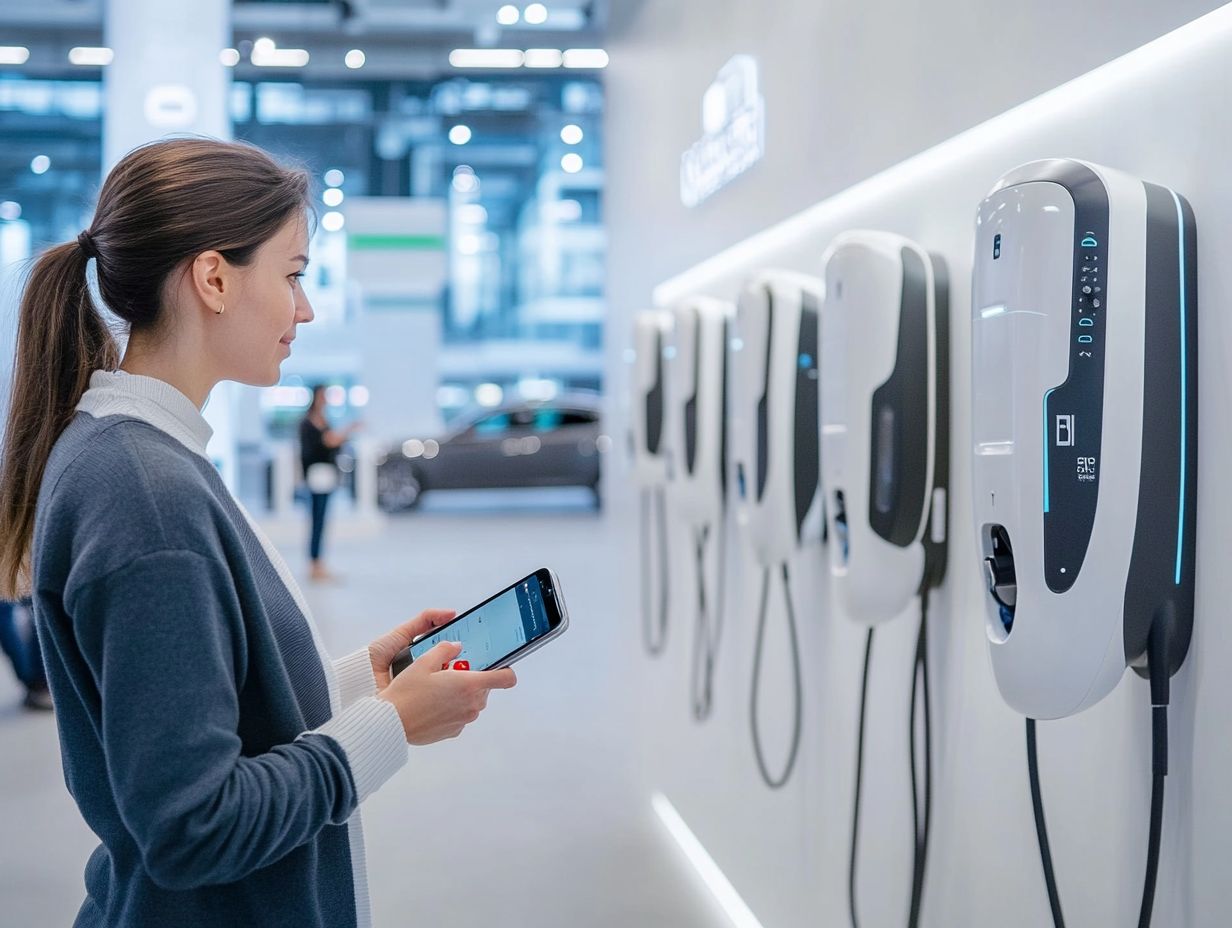
Costs for EV chargers vary widely, depending on the type of charging station, installation requirements, and available features. These factors influence both your initial expenses and your long-term savings.
When evaluating the financial aspects, it’s crucial to understand the distinctions between Level 1 and Level 2 chargers, as each comes with different installation details and energy efficiency levels. Typically, home installations are more budget-friendly, especially when you can take advantage of government rebates and incentives.
On the other hand, public chargers often involve higher installation costs due to the need to comply with safety standards and regulations.
By grasping how these standards affect costs, you can budget more effectively. Plus, incorporating solar power can lead to significant reductions in your electricity bills over time. Ultimately, striking a balance between your immediate investment and future energy savings is key to making an informed decision.
Installation and Maintenance of EV Chargers
The installation and maintenance of EV chargers are essential for providing a safe and efficient charging experience, whether at home or in public spaces.
Make sure to follow safety standards and ensure compatibility with your electrical panel. These factors significantly impact the overall functionality and safety of the charging process.
Installation Process
The installation process for EV chargers involves several critical steps to consider. First, evaluate the capacity of your electrical panel and ensure compliance with safety standards.
A thorough site assessment is essential. It helps determine the most suitable type of charger, whether you need a Level 1 or Level 2 model, based on your specific needs and local power capabilities. For new EV owners, exploring the best charging solutions is beneficial. Next, securing the services of qualified electricians is crucial; their expertise allows them to navigate local regulations and safely connect the charger to your existing electrical infrastructure.
As you move through the installation, be prepared for challenges like limited space, current electrical load restrictions, or outdated wiring. Expert problem-solving is key in these situations. By adhering to regulatory standards and following safe installation practices, you enhance efficiency and protect against potential electrical hazards.
Maintenance Requirements
Regular maintenance of your EV chargers is essential for optimal charging speed and safety. This ensures the longevity and reliability of your equipment.
Routine checks of electrical connections and cable inspections are crucial. Validate the functionality of internal components to catch potential issues early.
By keeping everything in top shape, you can avoid common problems like overheating or connectivity issues. A clean and functional charger supports safe operations for your electric vehicle charging system.
Frequently Asked Questions
What factors should I consider when choosing an EV charger?
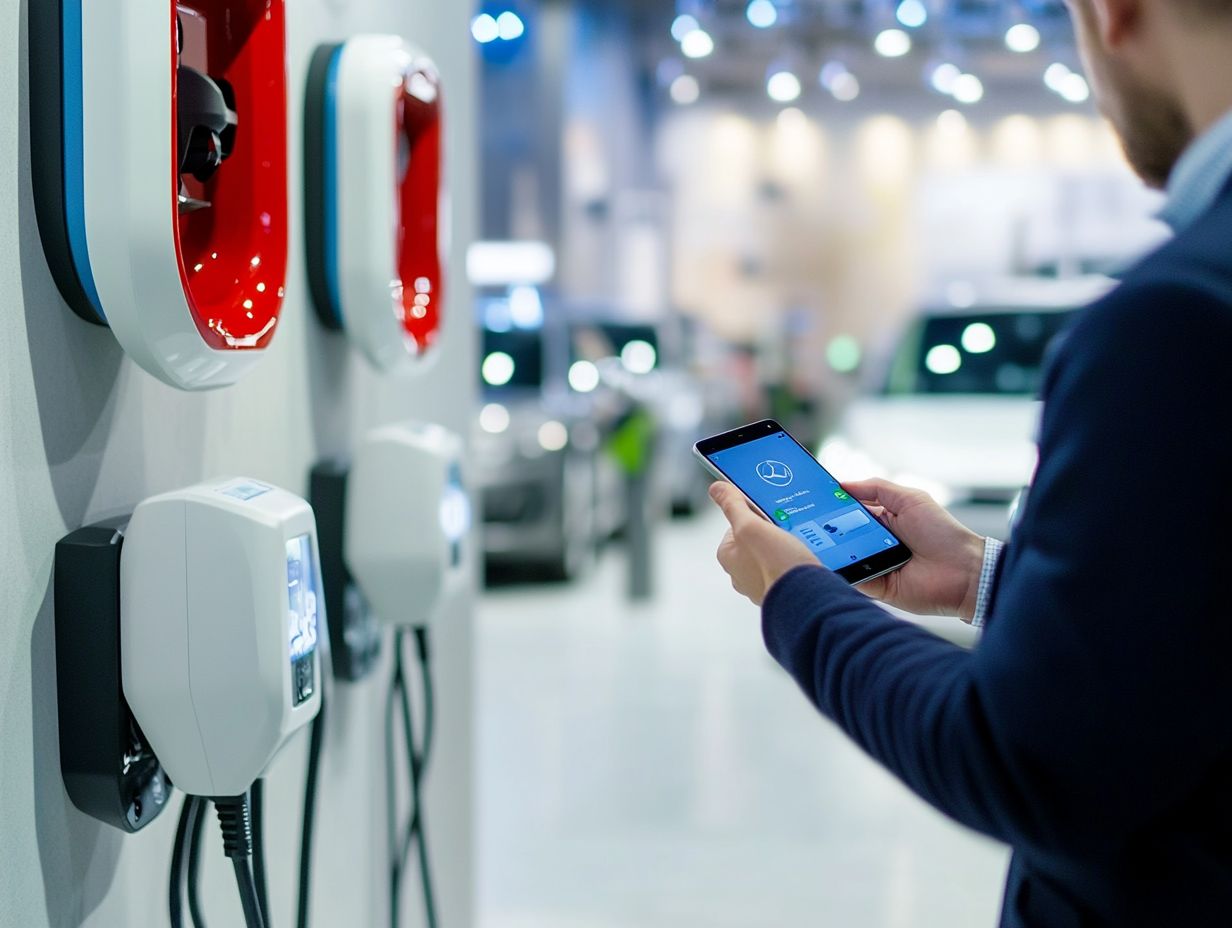
When choosing an EV charger, consider the charging speed and compatibility with your car’s charging port. Additionally, you may want to look into how to choose the right EV for your lifestyle by thinking about the availability of charging stations near your home or workplace.
What type of EV charger is best for me?
The best type of EV charger depends on your needs. Level 1 chargers work with standard outlets and are slower, while Level 2 chargers are faster but need special outlets. For those looking to optimize their charging, learning how to maximize your EV charging experience is essential, as DC fast chargers are the quickest but are less common and pricier.
How do I know if my car is compatible with a certain EV charger?
Most chargers work with all electric or plug-in hybrid vehicles. However, check your car’s charging port to ensure it matches the charger’s connector type.
Can I install an EV charger in my home?
Yes! If you have a parking spot or garage, you can install an EV charger. It’s wise to hire a professional electrician to ensure safe installation.
Are all EV chargers the same?
No, they vary by type and brand. Different charging speeds and connector types exist, along with features like wireless connectivity. Research and compare before deciding.
How can I find EV charging stations near me?
Use mobile apps and online platforms to locate nearby EV charging stations. Your local utility company or government may also have resources available.

